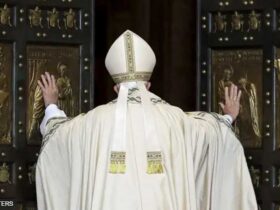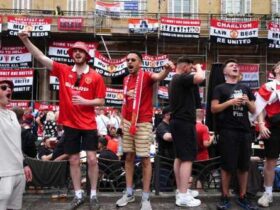Two numbers define the season of Barcelona, even if the figures barely capture the essence of them this season. A) They amassed 171 goals across all competitions with a La Liga week more to boost the number, the runaway best in Europe among the elite leagues. B) They caught their opponents offside 289 times, no one has mustered even half as many. Equally, a staggering 38 goals against them were ruled out for offside.
The numbers capture some of the striking aspects of their march: First, the prolific form of their forward-line. A revived Robert Lewandowski netted 40 goals in 50 games, Raphinha was involved in 59, Lamine Yamal stroked 18 and conceptualised 25. Then, the tactical intelligence of their dangerously high back-line to pull off the great off-side trap. But they don’t depict the thrilling role-swap of their wingers, the artistry of Pedri, the ruthlessness of Lewandowski, the vision of Frenkie de Jong, the dribble gnome that is Fermin Lopez, the creative zest of Dani Olmo, or the cohesion of the back-line. Or the sheer joy of watching a gifted group functioning at the outer reaches of their verve and trickery, a blend of smarts from the alleys and structure from academies, football as an expression of joie de vivre.
Barcelona fans should not be strangers to glory and joy. But this was not as they had experienced in the era of Johan Cruyff or Pep Guardiola. But closer to the spontaneous and uninhibited delights that marked the days of Ronaldinho, the Brazilian wizard who inspired unadulterated joy, who smiled and put a smile on the face of the beholder. It is unlike any Barcelona iteration in recent times.
The methods of Hansi Flick are similar yet dissimilar to the principles of Cruyff and Guardiola. The fixation with possession is a common thread. Barcelona have enjoyed an average possession of 68.9 percent in La Liga. The defence maintains a high-line, the midfield is manned by supreme passers with a wide range of passing. But Flick’s Barcelona is faster, more direct and vertical. Positional discipline—the soul of Guardiola—Cruyff manual—is not as adhered strictly to. So is the efficiency of through balls. The preference for homegrown talent, even though it is a consequence of financial strain, is another strand of commonality. The opening game featured three 17-year-olds. Throught the season, 13 academy graduates featured in different games.
It’s not death by a thousand passes, but murder with a single bullet, cowboy style, precise and piercing. He has instilled the gegenpress from the German school, making them a feared transitional side in Europe. When they lose the ball, they unflinchingly hound the adversaries and reclaim it. Young legs help—they have the youngest squad, the average age being 24, despite the presence of two poles in the mid 30s, Lewandowski and goalkeeper Wojciech Szczęsny, the latter cajoled back from retirement after captain Marc-André ter Stegen was ruled out midway through the season.
Once the ball is retrieved, they don’t construct the goal with elaborate build-up play, but quick, sharp passing. Guardiola loathed such an approach in his Barcelona days, though he is experimenting a similar style with City these days. His Barcelona was akin to poetry that conformed to syllable-perfect rhyme schemes. Every note, tone, and accent was placed where it should be. Every individual had a specific role that he performed to near-perfection. Apart from the uncontainable genius of Lionel Messi, few had the liberty to act on his own whims. It worked, like the London Symphony Orchestra.
Flick’s Barcelona is a fusion of orchestra and heavy metal. A team strumming to the synchronised chords before breaking up for a quick bass guitar solo. It’s both Mozart and Jimi Hendrix. It’s a triumph of both the collective and individual, both the system and individual coexisting in a harmonious union. Lamine Yamal embodies the idea of individualism. The 17-year-old is of such riveting talent that systems can’t stifle him. He is a breath of fresh air in the system and structure obsessed modern-football. His game is born in the streets, which honed his ability to glide along tight spaces, and nurtured at the La Masia, smoothing the rough edges. His wondrous strikes, often at the most opportune moment, are a treat, each goal reel-worthy.
But more delightful are his one-twos with Lopez or wing-swapping with Raphinha. Lopez, only 22, is a trickster with the stealth of an alley cat. In the latest El Clasico, he and Yamal combined to produce scintillating sequences that left Real Madrid’s defenders running circles. Raphinha was almost deliberating on exiting the club, before Flick revived him and gave him spatial freedom, unlocking his multifaceted skills. He can whip up pace like a conventional winger, break the lines like a modern one, score like a centre forward and assist like an inside forward. Barcelona, thus, could rattle opponents in many ways.











Leave a Reply